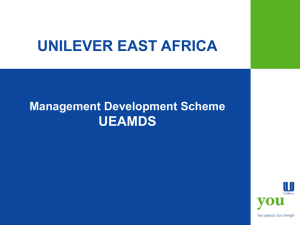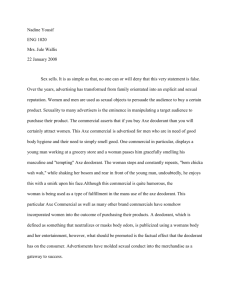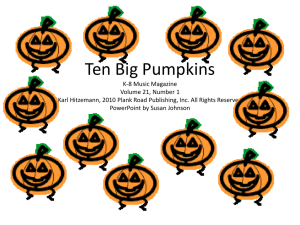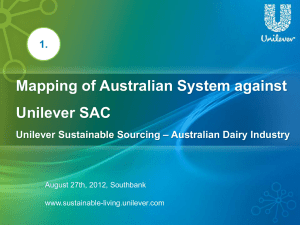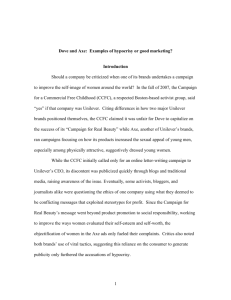Dove And Axe - Arthur W. Page Society
advertisement
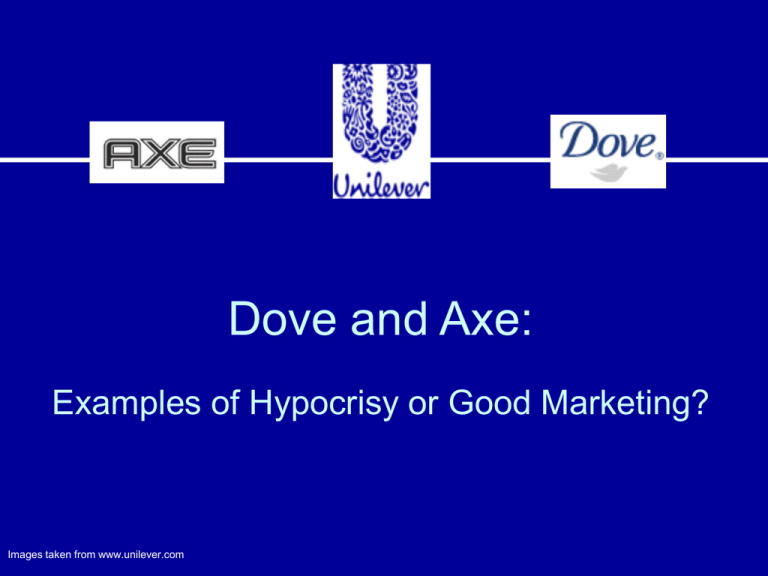
Dove and Axe: Examples of Hypocrisy or Good Marketing? Images taken from www.unilever.com Purpose of Case Study To Discuss: • How key publics can interpret messages differently. • What ethical responsibility, if any, exists for a company to ensure its brands send noncontradictory messages. • Whether the use of viral marketing impacts this ethical responsibility. • What extent a company should make sure its corporate social responsibility (CSR) messages permeate across all brands. Outline of Discussion • Overview of the issue • Unilever at the corporate level – Its stance on CSR – Its management structure • Unilever and the relationship between Dove and Axe • Different marketing messages: – Dove’s Campaign for Real Beauty – Axe’s “Bom Chicka Wah Wah” campaign • Viral tactics used by both brands • Discussion questions The Issue • First week of October, 2007: Dove releases “Onslaught,” challenging parents to “Talk to you daughter before the beauty industry does” • October 9, 2007: The Campaign for a Commercial Free Childhood (CCFC) alleges hypocrisy on behalf of Unilever, highlighting the different tone of messages from Dove and Axe • October - December: The issue is covered in blogs, trade publications and newspapers, while Unilever maintains the Axe ads are only a spoof and should be received in that way Unilever at the Corporate Level • Its mission, “To add vitality to life,” impacts: – The products it develops – The way in which it interacts with: • People • Communities • The environment • Its overall goal: “To help people look good, feel good and get more out of life.” Unilever at the Corporate Level Unilever’s leadership on its commitment to corporate social responsibility: “When we talk about corporate social responsibility, we don’t see it as something we ‘do’ to society. It is inherent in everything we do. Not just voluntary philanthropy or community investment, important though that is, but the impact of our operations and products as well as the interactions we have with the societies we serve.” -Niall Fitzgerald, former Unilever chairman, 2003 Unilever at the Corporate Level Unilever’s leadership on its commitment to corporate social responsibility (cont’d): “[Corporate responsibility] isn’t philanthropy, it’s business…it’s about creating social benefits through our brands and through our interactions as a business with society.” - Patrick Cescau, Unilever CEO, 2006 Unilever at the Corporate Level Management Structure: • Brands are managed according to both product category and region – Regional leaders are responsible for: • Deploying brands and innovation • Managing the business • Interfacing with customers – Product category leaders are responsible for: • Brand development • Innovation • Research/development • Advertising/marketing functions exist at both the brand and corporate levels Unilever at the Corporate Level Marketing Practices: • While marketing activities for each brand are subject to corporate guidelines, Unilever recognizes each brand may target a different group and communicate in a different way. • Unilever points to Dove and Axe as examples of this balance, noting they both support its vitality mission while addressing the needs of two different groups. The Campaign for Real Beauty • Based on national and international research on women’s perceptions of beauty – International Statistics: Only 2% of women feel comfortable describing themselves as beautiful, while 31% describe themselves as natural and 29% as average – National Statistics: U.S. women are more willing to rate their looks higher than their beauty, but 79% wish a woman could be considered beautiful if she is not “physically perfect” • Developed around these statistics to improve the worldwide understanding of “real beauty” The Campaign for Real Beauty • 2004: The Campaign asked women to judge ads using non-professional models as “oversized,” “outstanding,” “wrinkled”or “wonderful” and then place their vote on its website. • 2005: Ads challenged women to “Stand firm to celebrate their curves” by showing six women of differing ages, shapes and sizes photographed in their underwear. The Campaign for Real Beauty • 2006: The “Evolution” video uses time-lapse photography to illustrate how much a model’s natural appearance has likely been modified in an advertisement Images taken from “Evolution,” available at http://www.campaignforrealbeauty.com/dsef07/t5.aspx?id=7373&filmno=1 The Campaign for Real Beauty • 2007: The “Onslaught” video provides a montage of beauty industry images, including a multitude of products and cosmetic surgeries, as viewed through the eyes of a young girl. The video challenges parents to “Talk to your daughter before the beauty industry does.” Image from “Onslaught,” available at http://www.campaignforrealbeauty.com/dsef07/t5.aspx?id=7373&filmno=0 Axe and “Bom Chicka Wah Wah” Advertising/marketing communications from Axe… • Rely on the theme of “Giving guys the edge in the mating game.” • Utilize suggestive language in describing products by – Referring to Axe’s 9 scents as “the 9 ways.” – Suggesting men use the Clix scent “because the mating game is all about amazing figures. Spray on, sit back and count you clicks.” Axe and “Bom Chicka Wah Wah” Advertising/marketing communications from Axe… • Assert Axe products create the “Axe Effect,” which its website describes as an… “Internationally recognized name for the increased attention Axe-wearing males receive from eager, and attractive, female pursuers…Regardless of where you live, you can ‘get you some’ Axe effect by going to a store near you.” Axe and “Bom Chicka Wah Wah” The “Bom Chicka Wah Wah” Campaign • References a musical sound popular in 1970s pornographic videos • Understood as a pop-culture term for a “sexual encounter” • Features four girls named Bom, Chicka, Wah and Wah, supposedly in a 1970s style rock band Axe and “Bom Chicka Wah Wah” The “Bom Chicka Wah Wah” Campaign • Commercials: Five commercials depict young, attractive women who spontaneously blurt “bom chicka wah wah” when they encounter a man wearing an Axe scent • Website: – The “In Your Area” section includes a map of the United States where viewers can “Choose a hotspot…and watch women across the country loose their inhibitions, their minds…and often their clothes.” – The “Watch the Video” section features a music video of the “Bom Chicka Wah Wah” band singing lyrics like “your libido’s in control, surrender to the mist.” Viral Tactics from Both Brands Campaign for Real Beauty • The website provides: – A variety of materials that can be forwarded to friends, including: • Self-esteem development materials for young girls • Self-esteem training materials for moms and mentors • Campaign videos • Online discussion boards – An opportunity to contribute to the Self-Esteem fund or forward a request to someone else Viral Tactics from Both Brands Campaign for Real Beauty • Viral Videos (available on both the website and YouTube): – Evolution • Generated over 12 million YouTube views in its first year • Provided an estimated $150 million in free publicity – Onslaught • Viewed over 500,000 times in its first month and over 1 million times in its first 3 months Viral Tactics from Both Brands Axe • Received millions of views from its “Axe Effect” videos as they were forwarded by email when the brand launched in the United States. • Created a video-sharing campaign on the Boost Hookst mobile network to launch its “Naughty to Nice” promotion. • Provided online games and downloadable promotions with its “Axe Efffect,” “Naughty to Nice” and “Bom Chicka Wah Wah” campaigns. Discussion Questions 1. How much does Unilever’s commitment to social responsibility among all its brands impact any responsibility it has to ensure they do not use contradictory messages? 2. Could the brands be positioned in a way that sill respects their target audiences while also respecting each other’s ideals? Discussion Questions 3. Does Unilever’s corporate structure, which oversees the marketing activities of all brands and prohibits any one from operating with complete independence, make it more accountable for ensuring brand communications do not contradict? 4. Do Axe’s marketing messages, in which young, thin, attractive girls find any man who wears an Axe scent to be sexually attractive, make those of the Campaign for Real Beauty seem less truthful? Discussion Questions 5. To what extent should Axe’s “Bom Chicka Wah Wah” campaign, along with its others marketing messages, just be considered spoofs of the male approach to dating? Should the CCFC’s hypocritical assessment of Dove and Unilever be any different even if the ads are only intended as jokes? If so, how? 6. How, if at all, does the viral nature of both the Dove and Axe campaigns impact any responsibility Unilever has to ensure its communications messages are not contradictory? Discussion Questions 7. Would the validity of the CCFC’s hypocrisy claim be any different if both brands used either paid advertising spots or non-viral public relations tactics to send their messages? 8. To what extent should the CSR element of Dove’s message, which relates directly to important issues of self-esteem and self-worth for women, influence any responsibility Unilever might have to ensure its other brands do not contradict these messages?


